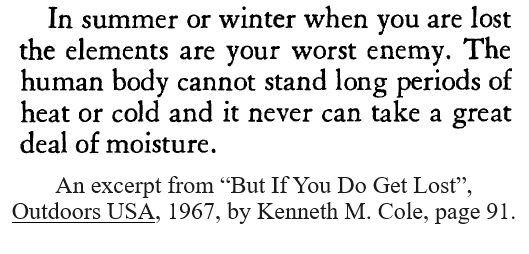As
long as people have been wandering the wilderness, people have become misplaced1
and have experienced an “unexpected overnighter”! Even Daniel Boone once famously admitted, “No,
I can’t say as ever I was lost, but I was bewildered once for three days”2
(for more read, “Being Bewildered and Bending the Map ©, HERE). But what hasn’t changed is what you are
supposed to do when it happens.
In
the early 1820’s, in what was then the wilderness, but today is what we call Medina
County, Ohio, USA, Mr. William H. Bell went out to look for his cows, but it
got dark, and he became confused as to the way home, so he stopped and sat down
by the side of tree and waited for morning’s light to make his trail home
clear. It was a common situation, but if
you read into this story there are three bits of excellent survival advice
buried in it, so let’s talk about them.
First,
NEVER travel after dark, unless you are absolutely certain of your path. If you are uncertain or bewildered, and you
travel through the wilderness after dark, at best you will only get more confused,
but at worst, if you give in to panic, you will become truly “lost”.
Also,
you could stumble and injure yourself, take a branch in your eye, injure
yourself falling into a ravine, or tumble into a creek or swamp, soaking yourself
and increasing your chances of hypothermia.
For more on “lost” versus “misplaced” read “You Are Only
As Lost As You Think You Are ©”, HERE.
Second,
as soon as you become confused, S.T.O.P., and admit that you are “misplaced”.
Stop, sit down, take a deep tactical breath or four, and calm yourself. Author and U.S. Army Ranger Lieutenant Colonel David Grossman, in his book On Combat, teaches a breathing technique called “tactical breathing”, which will help you combat stress, lower your heart rate, and allow you to think clearly3.
Observe
and organize. Take an inventory of the
items in your pockets or pack, and what’s in your immediate area that could help
you to survive for the next 72 hours, or until rescuers find you. To read what Les Stroud, the Survivorman
thinks about the O in S.T.O.P., read “The O in S. T. O. P. ©”, HERE.
Prioritize,
plan, and then put into effect your plan.
Avalanche expert, Orbell Apperson Jr. stated, “...one bad decision
followed through may be better than six great decisions that are, one by one,
acted upon and then abandoned. Changing
strategies is both physically and mentally draining”.
The
third thing we can learn from Mr. William H. Bell, who found shelter for the
night sitting next to a tree, is to stay warm, stay dry, and stay out of the
wind. Bivouacking on the lee side (the
sheltered side, the side away from the wind) of a ridge or hill, and then on
the sheltered side of a tree, rock, a blow-down, and huddling together for
warmth with your buddy, if you have one, will significantly increase your comfort
and warmth and your chances of survival.
So,
hopefully these three survival lessons from Mr. William H. Bell’s unexpected
overnighter in the 1820’s, can help us still to survive a wilderness emergency today.
I
hope that you continue to enjoy The Woodsman’s Journal Online and look for me
on YouTube at BandanaMan Productions for other related videos, HERE. Don’t forget to follow me on both The
Woodsman’s Journal Online, HERE,
and subscribe to BandanaMan Productions on YouTube. If you have questions, as always, feel free
to leave a comment on either site. I
announce new articles on Facebook at Eric Reynolds, on Instagram at
bandanamanaproductions, and on VK at Eric Reynolds, so watch for me.
That
is all for now, and as always, until next time, Happy Trails!
Notes
1
Personally, I hate the word “lost” and prefer to use the word “misplaced”,
because misplaced things, by definition, are eventually found. But lost things are lost forever. Being lost is scary!
2 Margaret
E. White, Editor, A Sketch of Chester Harding, Artist: Drawn By His Own Hand,
p. 48
3 Tactical
breathing is sometimes also called combat or box-breathing and it works like
this:
· Breath
in a deep breath through your nose taking 4 seconds to slowly fill your lungs, “and-one, and-two, and-three, and-four”.
· Hold
your breath for 4 seconds, “and-one, and-two, and-three, and-four”.
· Exhale
slowly through your mouth for 4 seconds, “and-one, and-two, and-three, and-four”.
· Hold
your breath for 4 seconds, “and-one, and-two, and-three, and-four”.
Repeat
this four times or until your heart rate slows and you can think clearly.
Sources
Cleese,
Rose Marie; “Winter Survival: It’s All In your Head”, Skiing, January 1975, https://books.google.com/books?id=hFGikpZMQdAC&pg=PT60&lpg=PT60&dq=%22Winter+Survival:+It%E2%80%99s+All+In+your+Head%22&source=bl&ots=of1ReiSM07&sig=ACfU3U2xIUcCYJepMVYvHe2MX2dnPW7yKw&hl=en&sa=X&ved=2ahUKEwi_-PvKk9uDAxXqFFkFHe77C28Q6AF6BAgJEAM#v=onepage&q=%22Winter%20Survival%3A%20It%E2%80%99s%20All%20In%20your%20Head%22&f=false,
accessed January 13, 2024
Perrin, W. H., Battle, J. H.,
and Goodspeed, W. A.; History of Medina County and Ohio, [Baskin &
Battey, Chicago, 1881], page 468-469, https://books.google.com/books?id=jOsLHjmVqooC&pg=PA468&dq=%22people+were+often+lost+in+the+woods%22&hl=en&newbks=1&newbks_redir=0&sa=X&ved=2ahUKEwjn6pT83NaDAxWWAHkGHdPpCgsQ6AF6BAgLEAI#v=onepage&q=%22people%20were%20often%20lost%20in%20the%20woods%22&f=false, accessed January 11, 2024
“Outward
Bound's 50th Anniversary in the US”, http://outwardbounds50thanniversary.weebly.com/pioneering-staff.html,
accessed January 13, 2024
United States Department of Agriculture, Outdoors
USA: 1967 Yearbook of Agriculture, [United States Government Printing
Office, Washington, DC, 1967], p 87-89, https://archive.org/details/yoa1967/page/n3,
accessed
January 13, 2024
Wikimedia,
“A Landscape near Boldrewood”, by Alfred Parsons, 1871, https://commons.wikimedia.org/wiki/File:Alfred_Parsons_-_A_Forest_Landscape_near_Boldrewood_-_B1979.12.786_-_Yale_Center_for_British_Art.jpg,
accessed January 13, 2024
White,
Margaret E. Editor; A Sketch of Chester Harding, Artist: Drawn By His Own
Hand, (Houghton, Mifflin and Company, New York [1890]) p 47-48 reprinted in
https://books.google.com/books?id=zgROAAAAMAAJ&pg=PA48&lpg=PA48&dq=%22he+had+a+very+large+progeny%22+%22chester+harding%22&source=bl&ots=I9y_v-yRI2&sig=qxwqKUR9y42naWBjhoArGJi2P5U&hl=en&sa=X&ved=2ahUKEwj4goGi7czdAhXEnOAKHWvECaoQ6AEwAHoECAUQAQ#v=onepage&q=%22he%20had%20a%20very%20large%20progeny%22%20%22chester%20harding%22&f=false,
(accessed 9/21/2018)
Wikimedia,
“Unfinished Portrait of Daniel Boone”, https://upload.wikimedia.org/wikipedia/commons/7/79/Unfinished_portrait_of_Daniel_Boone_by_Chester_Harding_1820.jpg,
(accessed 9/21/2018)







%20Walsh%202400625.jpg)




No comments:
Post a Comment